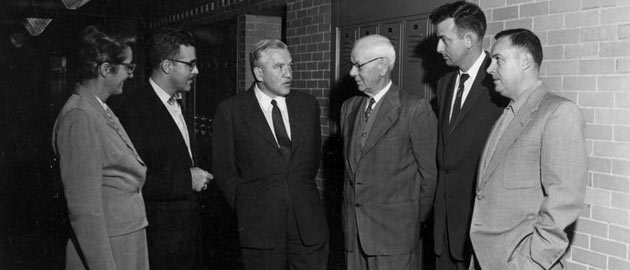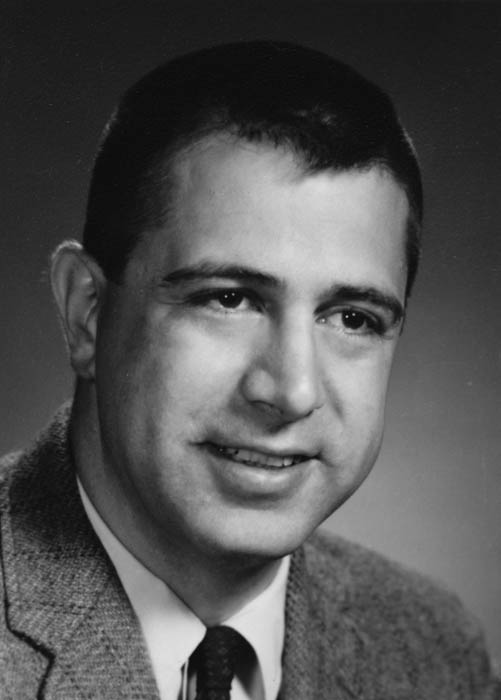
William Hardy Eshbaugh
 Photo June 7, 1967
Photo June 7, 1967
In SIUC Botany from 1965 to 1967
Dr. W. Hardy Eshbaugh obtained a B. A. from Cornell University, an M.A. from Indiana University, and a Ph.D. in 1964 from Indiana University, both of these degrees working under Dr. Charles Heiser. Dr. Eshbaugh came to SIUC December 7, 1965 and left June 1967. His academic career blossomed at his new location, Miami University in Oxford, Ohio. The following biosketch gives some of the highlights of his career there.
Dr. W. Hardy Eshbaugh (b. 1936) is Professor Emeritus of Botany, Miami University, Oxford, Ohio and Research Associate, Missouri Botanical Garden, St. Louis. In 1991 he received the Benjamin Harrison Award (Medallion) from Miami University, the institutions highest award for faculty "in recognition of contributions to the advancement of education to the nation." In 1992 he was awarded the Botanical Society of America's Certificate of Merit as an "Inspiring and caring teacher, dedicated researcher, able administrator and champion of the science of botany." He was awarded an Outstanding Teacher Award at the Greater Cincinnati Consortium of Colleges and Universities Celebration of Teaching in 1992. In, 1996-97, he was selected for the Distinguished Educator Award of the College of Arts and Science at Miami University. In 2006 the Botanical Society awarded him the Centennial Award and the Charles Edwin Bessey Award for his “continuing efforts to bring additional understanding of the natural world to public at large.” In February 2005 he was awarded The Great Egret Award by the National Audubon Society in recognition of his lifetime of service to the cause of conservation at the national, state, and local level. In 2006 The St. Mary’s River Association, Nova Scotia selected him as their conservationist of the year. Eshbaugh received the Ohio Biological Survey 2006 Osborn Award “to recognize noteworthy accomplishments and service in the field of biology.” He was selected as Oxford, Ohio’s Citizen of the Year for 2002.
Dr. Eshbaugh is the President of the Elizabeth Wakeman Henderson Charitable Foundation. Dr. Eshbaugh served on the Board of Directors of the National Audubon Society (1994-2006) serving as Vice-Chairman and is the past Chair of the Development Committee. He is on the Board of the bi-national Atlantic Salmon Federation (2002-2008) and Hawk Mountain (2007- ). He is President of the Avian Research and Education Institute (2005 - ), He is Past-President of the American Institute of Biological Sciences (1996), the American Society of Plant Taxonomists (1991-92), the Botanical Society of America (1988-89), and the Society for Economic Botany (1983-84). He is a Fellow of the American Association for the Advancement of Science (1990) and the Ohio Academy of Science (1977). He has been Associate Program Director for Systematic Biology at the National Science Foundation (1982/83) and Vice-Chairman of the Ohio Chapter of The Nature Conservancy (1970/75). He currently serves on the Board of Directors of the American Botanical Council. He served as one of the Co-chairs of the Systematics Agenda 2000 - Charting the Biosphere initiative. His published works include two books, over 100 research and general papers and more than 20 book reviews. Dr. Eshbaugh's research career has focused on investigation on the origin and evolution of Capsicum (chili peppers) and the flora and biogeography of the Bahamas. More recently, Dr. Eshbaugh has devoted his energies to various conservation issues and in particular on ecotourism as a tool for effective conservation especially in the developing world.
Dr. Eshbaugh has extensive international experience having taught and led field natural history courses and trips in the Bahamas, Nova Scotia and Newfoundland, Amazonian Peru, Costa Rica, and Uganda. He has traveled and consulted on trips to Greenland and the high Canadian Arctic, and the Antarctic. His research on the origin and evolution of chili peppers has taken him throughout Latin America, the Amazon, and Andean South America many times. He has been to East Africa and South Africa conducting research and as a participant in several international meetings on the botany of sub-Sahara Africa. Dr. Eshbaugh is a fellow of the Explorer’s Club (1980).
